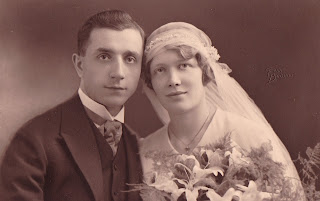WHY OUR STORIES MATTER
I've been thinking a lot about memoirs lately. I'm embarrassed to say that in the past I didn't give the genre much value, primarily because I was confusing memoir with autobiography. Autobiography tends to be about someone who is well known and focuses on the formative events that led to their success while a memoir is usually about emotional truth and people who may or may not be famous (at least not until they write a best-selling memoir)! I was under the misguided impression that a person should be a celebrity of some kind or at least have a super interesting life experience to share like being raised by circus clowns or getting stuck on a deserted island.
As a result of the pandemic, I've realized how important all of our stories are. We've had relatives, maybe not even that long ago, who survived pandemic, polio, pox, or plague, otherwise, we wouldn't be here. Wouldn't it be nice if they had left behind a written record of their experiences so we weren't so surprised and unprepared when the coronavirus hit us? Sure, we can all google information about what the Spanish Flu was like in New York City, but what about small-town Texas, or Boise, Idaho?
Flashing forward a few decades, I think about my yet-to-be-born great-grandchildren. When tragedy strikes, whether it be pandemic, war, economic collapse, or something else, wouldn't it be nice for them to be able to find comfort and strength in family stories? Would it be grand to have something more to rely on for information, experience, and hope, besides the media and whatever they had to say about the last pandemic or whatever? Only a small number of our stories about covid will ever be published. Must our great-grandchildren rely on those stories for their history? I think it's time we start honoring our family stories, and not just the stories about tragedy and loss, but also the stories about our hopes, dreams, and love.
Last year both my father and mother-in-law died, one from a trying illness and one unexpectedly from covid. I wish they had both told me more of their stories. I found myself with bits and pieces of their lives trying to put together a patchwork quilt with too many missing pieces. I've been going through old photographs, reflecting back on what few stories they told me of their childhood, and talking to people who knew them when they were young.
The need for this investigation feels even more urgent because our first grandchild was born between the two deaths. Exactly six weeks after one, and ten weeks prior to the other. It's an important reminder that life goes on, but how will she understand where she came from if these stories are lost? On a similar note, how will she know my story if I don't write it down? Oral storytelling is becoming a lost art, so if we don't write down our stories, they most likely will be lost.
As I consider how to capture the stories I want to pass along, I've been contemplating the difference between memoir and autobiography. Below is a brief look at the major differences between the two. I'm not an expert on the subject, so if you want more information, look at the sources I used: Writersdigest.com, Masterclass.com, Bookriot.com. For tips on how to use mentor texts to encourage memoir writing in kids, see Bridging the Gap: Reading Critically and Writing Meaningfully to Get to the Core by Lesley Roessing, M. Ed. For a list of top adult memoir books, see the Writer's Digest post 19 Memoirs Aspiring Memoir Writers Should Consider Reading.
MEMOIR VS. AUTOBIOGRAPHY
TIMELINE: An autobiography typically follows a straight chronological timeline, starting with birth and covering a person's life to date. A memoir can move back and forth in time or cover one small segment of time like a day in the life, a summer romance, or a person's formative years. Memoir may move through time chronologically but emphasize just one aspect of a person's life such as the relationship with a parent or overcoming a fear of public speaking.
SUBJECT: As mentioned above, an autobiography is usually about someone famous or well known and focuses on facts and experiences that led to their fame while a memoir can be about anyone and tends to be about emotions or ideas. Memoir may stick close to the truth or deviate from facts since this form relies on memories, which we all know can be faulty. Leslie Roessing, M. Ed., is a featured author in my book, Story Frames for Teaching Literacy: Enhancing Student Learning Through the Power of Storytelling (Brookes Publishing, 2021). She wrote the chapter entitled, "Memoir: Writing Our Lives," and states on p. 203, "Memoir is based on how writers remember events and what those events meant to them. Memoir differs from personal narrative in that memoir includes reflection on the importance of the persona, place, memento, or event, while personal narrative is a story of events as they happen."The emphasis is on using facts for the purpose of relating an emotional truth with more weight given to the idea than the validity of the facts. On the other hand, because of its stricter focus on facts, autobiography often includes references to world events, which should be portrayed with accuracy. Historians often use autobiographies in their research making the emphasis on truth even more important.
STYLE: An autobiography tends to use a more formal style with language that is to the point while a memoir can be more casual or even humorous and may contain figurative language. Both tend to be written in the first person (I), but are sometimes written in the third person (he, she) as if being told by someone else.
AUTOBIOGRAPHICAL
Another term that can be misleading is the word autobiographical. It is often used to refer to an autobiography, but sometimes a fictionalized story has autobiographical elements. Stories can be inspired by true events and contain very little actual truth. On the other hand, sometimes fiction based on real-life experiences contains more emotional truth than a straight retelling of the facts.
A FINAL NOTE
Reflecting on these terms makes me wonder if there is a form of biography that is similar to memoir where we might have the license to write about the emotional truth of another person and fill in the blanks where information is missing. Then again, can we ever know someone else's truth? I suppose that is another good reason to write our own story. If we don't do it, someone else might do it for us.
Subscribe to my monthly newsletter HERE and receive a FREE fill-in-the-blank story template PDF called Travel Trouble. Each month you will get updates, activities, and tips about writing and working with students along with book news.

